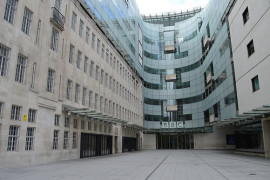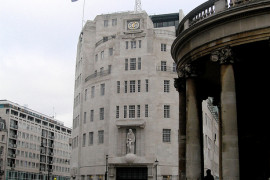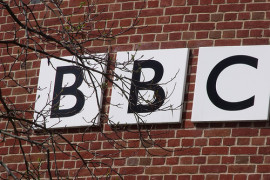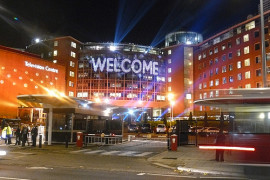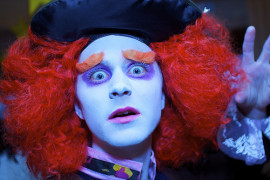The killing last August of a well-liked Polish man, ‘Arek’ Jóźwik, after a late night fracas in a pizza parlour in Harlow sent the BBC newsgathering operation into overdrive.
It was the end of the silly season and only ten weeks after the referendum.
The BBC, of course, was then, as now, hell-bent on finding and giving maximum exposure to every possible reason why the Brexit vote was a catastrophic mistake.
To the Corporation, which for years has also been on a mission to downplay the impact of immigration on the UK and to label opponents as at best xenophobic, at worst racist, this was a story that ticked every box. They dived into reporting the crime with grim, hyperbolic relish.
BBC1 man-on-the spot Daniel Sandford gave most prominence in his feature for the BBC1 bulletins on August 31 to that the alleged crime – prematurely said by him to be a ‘murder’ – was being investigated as a frenzied attack by a gang of six local youths triggered by race hate stirred up by the referendum vote.
To ram home the message about the race-hate dimension, Sandford carefully collected and edited quotes from the Polish ambassador and Robert Halfon, the local MP.
To be fair, he also mentioned that police were considering other options, such as ‘youths looking for trouble’, but there was no doubt which reason for the attack he thought was more likely.
And later that evening, on BBC2’s Newsnight, correspondent John Sweeney’s outro to his feature about the death was a quote from a friend of Mr Jóźwik, who declared that Nigel Farage had ‘blood on his hands’. The full transcripts of the Sweeney and Sandford reports are contained in the correspondence with the BBC, below.
Fast forward to the present. It has since emerged that Mr Jóźwik’s death was not murder at all. Nor, say the police, was race-hate involved, and nor was the crime committed by a frenzied gang of youths.
Instead, a sole 15-year-old youth has been charged with manslaughter. He has indicated a plea of ‘not guilty’ at a preliminary hearing at Chelmsford Crown Court and has been released on conditional bail until his trial, which is expected to be in July.
It has also emerged since Sandford’s report in August that police are now convinced that a rise in the reporting of race hate crimes during the summer – heavily stressed by the BBC after June 23 and undoubtedly part of the reason the facts of the Harlow killing were so heavily exaggerated – was not linked at all to the referendum, but was the result of better and easier self-report procedures.
After Harlow, some journalists (unlike the BBC) decided to investigate further. They found that ‘race hate’ domain has become a major self-perpetuating and highly lucrative industry in its own right. One of the main hubs of this new world-wide enterprise is Sussex University where its principal advocate is partly lavishly funded by (you may have guessed)…the EU.
News-watch filed a formal complaint about Sandford’s report. This claimed in essence that the reporting of Harlow was deeply irresponsible journalism that deliberately sensationalised the known facts about the killing, and too readily linked it to ‘race hate.’ There was supporting evidence showing how very rare killings with a racial motive are in the UK, and warning that the available statistics were not reliable.
This was rejected by the Complaints Unit. The verdict? Move along there, nothing to see – Sandford (whose name was misspelled by the complaints officer) was merely doing his job.
Under the Corporation’s elaborate complaints rules, News-watch in early January submitted an appeal to the BBC Trust about the ruling. Former BBC producer Fran O’Brien, who is now the Trust’s Head of Editorial Standards, has now, finally – a month later than the maximum time permitted under the BBC’s own rules – responded.
Her decision? Surprise, surprise, exactly the same as the Complaints Unit. There was, she ruled, no exaggeration, no inaccuracy, no breach of rules linked to over-emphasising ‘race-hate’. Everything was totally tickety-boo and in line with the BBC Editorial Guidelines.
And that, said O’Brien, was that. Her verdict was final: there could be no appeal. As far as the Trust is concerned, the matter is well and truly closed. The full letter from O’Brien can be read below.
In two weeks, of course, from April 2, the Trust will be no more. Under the new BBC Charter, its role in adjudicating complaint appeals is being taken over by the Content Board at Ofcom.
But this last-gasp ruling underlines yet again that BBC journalism exists in its own bubble, and the Complaints Unit does nothing to prick it; if anything the reverse. The Corporation reports on its terms, no matter how inflammatory or at odds with the facts and common sense its output is.
The blunt truth is that the Sandford report of Mr Jóźwik’s killing grossly and irresponsibly exaggerated the race-hate dimension and must be seen in the overall context of the BBC’s determined desire to undermine the referendum result.
It’s now down to Ofcom to sort out BBC bias. Don’t hold your breath. First, the Content Board is packed with ex-BBC staff, and second, the overall Ofcom boss, Sharon White, seems more focused on the diversity agenda and getting more women on screen than clearing the Augean stables.
The reality is that until BBC bias is governed by genuinely independent scrutiny, the Corporation will remain locked in that skewed journalistic bubble – massively and crassly out of touch with the British people.





